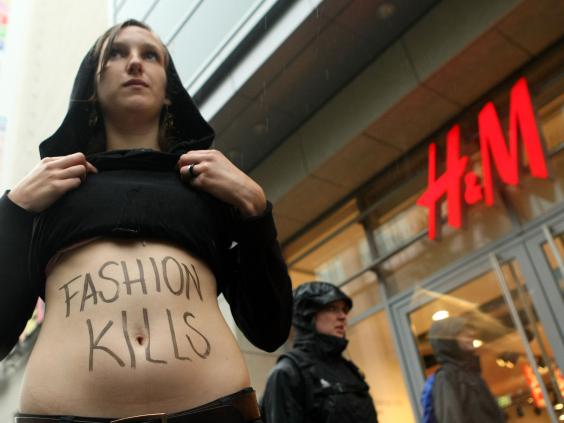Syrian refugee children found working in Next and H&M factories
Next and H&M say refugees in Turkey were working in their supply-chain factories

Your support helps us to tell the story
From reproductive rights to climate change to Big Tech, The Independent is on the ground when the story is developing. Whether it's investigating the financials of Elon Musk's pro-Trump PAC or producing our latest documentary, 'The A Word', which shines a light on the American women fighting for reproductive rights, we know how important it is to parse out the facts from the messaging.
At such a critical moment in US history, we need reporters on the ground. Your donation allows us to keep sending journalists to speak to both sides of the story.
The Independent is trusted by Americans across the entire political spectrum. And unlike many other quality news outlets, we choose not to lock Americans out of our reporting and analysis with paywalls. We believe quality journalism should be available to everyone, paid for by those who can afford it.
Your support makes all the difference.Two of Britain’s high street giants have found Syrian refugee children working in their clothing factories in Turkey, leading to calls for other retailers to investigate their own supply chains.
H&M and Next were the only retailers that admitted to identifying child labour in supplier factories in Turkey, but there are fears that the phenomenon could be far more widespread after several other companies failed to answer questions on the use of Syrian workers in their factories.
Along with China, Cambodia and Bangladesh, Turkey is one of the largest producers of clothing sold on the British high street, supplying labels that include Topshop, Burberry, Marks & Spencer and Asos.
The country is also the world’s largest host of Syrian refugees, accepting more than 2.5 million people who have fled the conflict since 2011.
A report by the Business and Human Rights Resource Centre (BHRRC), a non-profit organisation that monitors company ethics, warns that few brands are taking adequate steps to ensure that vulnerable refugees are not “fleeing from conflict into exploitative working conditions”.
Though Ankara has won praise for its “open door” policy towards Syrian refugees, it was not until this month that it announced that they would be given the right to work after striking a deal with the EU as part of an effort to reduce the numbers flocking to Europe.
Hundreds of thousands of Syrian adults in Turkey work for low pay far below the minimum wage of 1,300 Turkish lira (£309) per month. Many children are employed as cheap labour on farms and factories in breach of Turkish and international laws that forbid those under 12 from working. Children aged 13-14 are banned from all but light work.
In an effort to gauge the scale of the problem, the BHRRC asked 28 major brands last month about their Turkish suppliers and their strategies for combating the exploitation of Syrian children and adults.
H&M and Next were the only ones which revealed that they had identified child labour over the course of 2015. Both companies said that they had taken action to return the children to education and support their families. They did not specify their ages.
Primark and C&A said they had identified adult Syrian refugee workers. Adidas, Burberry, Nike, and Puma all stated that no undocumented Syrian refugees were found in their supply chain. So too did Arcadia Group, which owns Topshop, Dorothy Perkins and Burton Menswear.
All other brands that responded – including M&S, Asos, Debenhams and Superdry – remained silent on the question of Syrian workers. Ten companies, including GAP, New Look and River Island, have yet to respond.
The BHRRC said that it was alarmed by the responses, warning: “Only a few brands appear to have engaged with the extent and the complexity of these issues in their Turkish supply base; even fewer report taking action to protect these vulnerable workers.” It said that many companies appeared to have an “out of sight, out of mind” approach to auditing their factories, conducting preannounced visits that could allow factory managers to cover up abuses.
Phil Bloomer, executive director of the BHRRC, said that H&M and Next deserved praise for their honesty and urged other companies to take the problem seriously. He said: “No brands want child labour in their supply chain, but what matters is how vigorous they are in looking for it and what they do when they find it. Given reports from the ground indicate refugee child labour is common in Turkey, it is positive that two brands in our report identified this problem and took action to protect the children. We need all brands to show equal vigour in eliminating this curse.”
Join our commenting forum
Join thought-provoking conversations, follow other Independent readers and see their replies
Comments